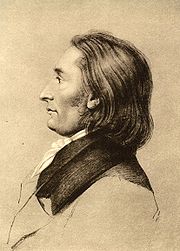
Johann Peter Eckermann
Encyclopedia

Germany
Germany , officially the Federal Republic of Germany , is a federal parliamentary republic in Europe. The country consists of 16 states while the capital and largest city is Berlin. Germany covers an area of 357,021 km2 and has a largely temperate seasonal climate...
poet
Poet
A poet is a person who writes poetry. A poet's work can be literal, meaning that his work is derived from a specific event, or metaphorical, meaning that his work can take on many meanings and forms. Poets have existed since antiquity, in nearly all languages, and have produced works that vary...
and author
Author
An author is broadly defined as "the person who originates or gives existence to anything" and that authorship determines responsibility for what is created. Narrowly defined, an author is the originator of any written work.-Legal significance:...
, is best known for his work Conversations with Goethe, the fruit of his association with Johann Wolfgang von Goethe
Johann Wolfgang von Goethe
Johann Wolfgang von Goethe was a German writer, pictorial artist, biologist, theoretical physicist, and polymath. He is considered the supreme genius of modern German literature. His works span the fields of poetry, drama, prose, philosophy, and science. His Faust has been called the greatest long...
during the last years of Goethe's life.
Biography
Eckermann was born at Winsen in HanoverHanover
Hanover or Hannover, on the river Leine, is the capital of the federal state of Lower Saxony , Germany and was once by personal union the family seat of the Hanoverian Kings of Great Britain, under their title as the dukes of Brunswick-Lüneburg...
, of humble parentage, and was brought up in penury and privation.
After serving as a volunteer in the War of Liberation
Napoleonic Wars
The Napoleonic Wars were a series of wars declared against Napoleon's French Empire by opposing coalitions that ran from 1803 to 1815. As a continuation of the wars sparked by the French Revolution of 1789, they revolutionised European armies and played out on an unprecedented scale, mainly due to...
(1813–1814), he obtained a secretarial appointment under the war department at Hanover. In 1817, although twenty-five years of age, he was enabled to attend the gymnasium of Hanover and afterwards the university of Göttingen, which, however, after one year's residence as a student of law
Law
Law is a system of rules and guidelines which are enforced through social institutions to govern behavior, wherever possible. It shapes politics, economics and society in numerous ways and serves as a social mediator of relations between people. Contract law regulates everything from buying a bus...
, he left in 1822.
His acquaintance with Goethe began in the following year, when he sent to him the manuscript of his Beiträge zur Poesie (1823). Soon afterwards he went to Weimar
Weimar
Weimar is a city in Germany famous for its cultural heritage. It is located in the federal state of Thuringia , north of the Thüringer Wald, east of Erfurt, and southwest of Halle and Leipzig. Its current population is approximately 65,000. The oldest record of the city dates from the year 899...
, where he supported himself as a private tutor. For several years he also instructed the son of the grand duke. In 1830 he travelled in Italy
Italy
Italy , officially the Italian Republic languages]] under the European Charter for Regional or Minority Languages. In each of these, Italy's official name is as follows:;;;;;;;;), is a unitary parliamentary republic in South-Central Europe. To the north it borders France, Switzerland, Austria and...
with Goethe's son. In 1838 he was given the title of grand-ducal councillor and appointed librarian to the grand-duchess.
Writings
Eckermann is chiefly remembered for his important contributions to the knowledge of the great poet contained in his Conversations with Goethe (1836–1848). To Eckermann Goethe entrusted the publication of his Nachgelassene Schriften (posthumous works) (1832–1833). He was also joint-editor with Friedrich Wilhelm RiemerFriedrich Wilhelm Riemer
Friedrich Wilhelm Riemer was a German scholar and literary historian. He worked in the households of Wilhelm von Humboldt and Johann Wolfgang von Goethe.-Biography:Riemer was born at Glatz...
(1774–1845) of the complete edition of Goethe's works in 40 vols (1839–1840). He died at Weimar on the 3rd of December 1854.
Eckermann's Gespräche mit Goethe (vols: i. and ii. 1836; vol. iii. 1848; 7th ed., Leipzig, 1899; best edition by Ludwig Geiger
Ludwig Geiger
Ludwig Geiger was a German author and historian, born at Breslau, a son of Abraham Geiger. After study at Heidelberg, Göttingen, and Bonn, he became docent in history at Berlin in 1873 and in 1880 was appointed to a chair of modern history there...
, Leipzig, 1902) have been translated into almost all the European languages. (English translations by Margaret Fuller, Boston, 1839, and John Oxenford
John Oxenford
John Oxenford , English dramatist, was born at Camberwell, London, England.-Life:He began his literary career by writing on finance...
, London, 1850.)
Besides this work and the Beiträge zur Poesie, Eckermann published a volume of poems (Gedichte, 1838), which are of little value. See J. P. Eckermanns Nachlaß edited by Friedrich Tewes, vol. i. (1905), and an article by RM Meyer in the Goethe-Jahrbuch, xvii. (1896).

